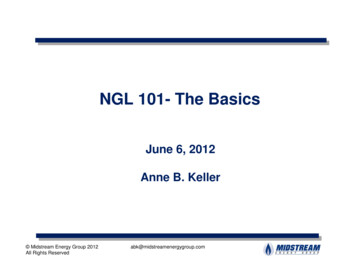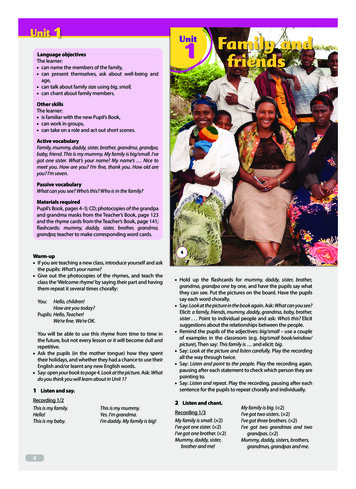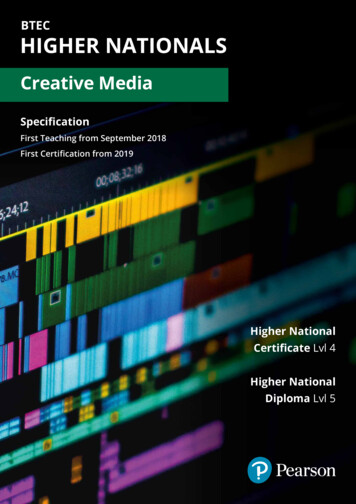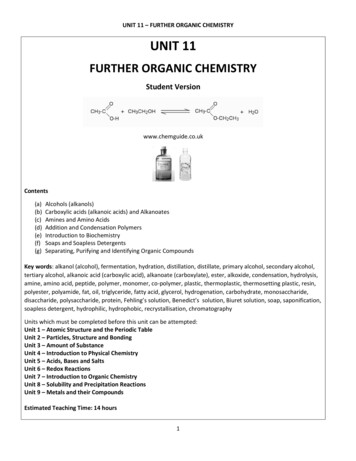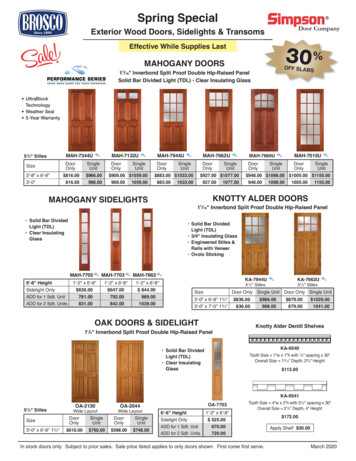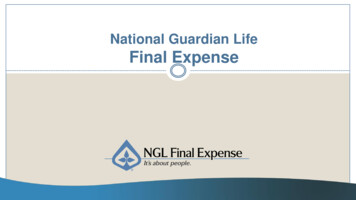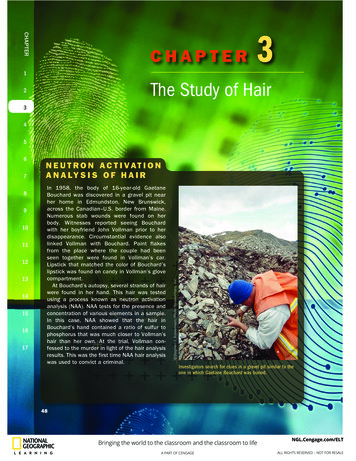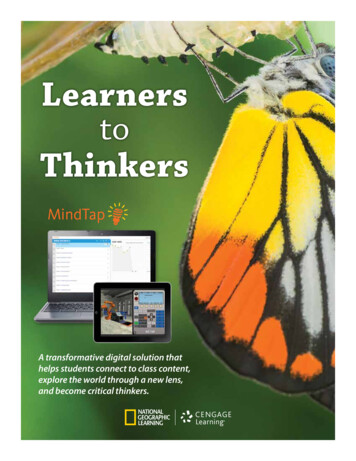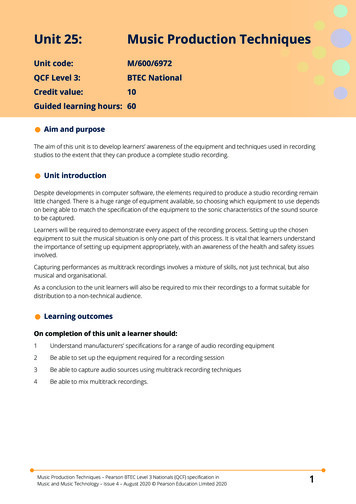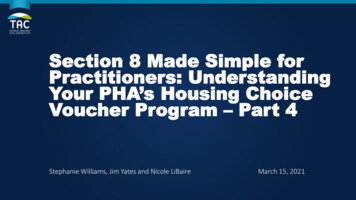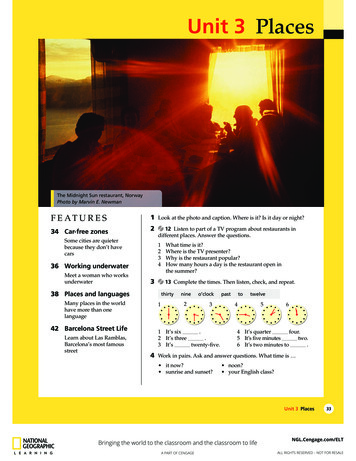
Transcription
Unit 3 PlacesThe Midnight Sun restaurant, NorwayPhoto by Marvin E. NewmanF E AT U R E S1 Look at the photo and caption. Where is it? Is it day or night?34 Car-free zones2Some cities are quieterbecause they don’t havecars123436 Working underwaterMeet a woman who worksunderwater12 Listen to part of a TV program about restaurants indifferent places. Answer the questions.313 Complete the times. Then listen, check, and repeat.38 Places and languagesMany places in the worldhave more than onelanguage42 Barcelona Street LifeLearn about Las Ramblas,Barcelona’s most famousstreetWhat time is it?Where is the TV presenter?Why is the restaurant popular?How many hours a day is the restaurant open inthe summer?thirty1nine2o’clockpast3to41 It’s six.2 It’s three.twenty-five.3 It’stwelve564 It’s quarterfour.5 It’s five minutestwo.6 It’s two minutes to.4 Work in pairs. Ask and answer questions. What time is it now?sunrise and sunset? noon?your English class?Unit 3 Places55777 02 P02 P009-080 ptg01.indd 333312/03/14 11:01 AM
3a Car-free zonesReadingVocabulary adjectives about cities1 Read the article and match the cities3 Underline all the adjectives in the article in Exercise 1.with the photos (1–4).Which adjective means:1 doesn’t cost money2 lots of people?3 has bad air?4 many people like it?5 very good?2 Answer the questions.1 What is a problem in many cities?2 Why is it a problem?3 How many people live indowntown London?4 What is beautiful in downtownLondon?5 What are popular in Tokyo?6 How many people take the bus towork in Bogotá?7 Why is Bourke Street popular?Which adjective means the opposite of:9 cheap6 quiet7 ugly10 big8 dirty11 old4 Work in pairs. Which places in a city you know are: free or cheap?small and crowded?polluted and noisy? modern and popular?beautiful and relaxing?1C a r - f r e eZ O N e SMany people have cars in the city. But pollution is aproblem because of the traffic. Nowadays somedowntown areas around the world don’t have cars. Thesecar-free zones are areas for people, bicycles, andpublic transportation only.LondonEight million people live in the center of London andanother two million people go to work there everyday. The downtown area is very noisy with hundredsof cars, buses, and taxis, but there are also a lot ofbeautiful parks with free music concerts. At lunchtimeand after work, many people go there for a break.2TokyoParts of Tokyo are always crowded with hundreds ofpeople—but no cars! These modern car-free zonesare very popular and people like shopping there.BogotáIn the past, Bogotá was polluted because there werelots of cars and traffic. Now the downtown area is a carfree zone and the air is clean! Many people don’t havea car and half a million people take the bus to work.MelbourneIn many cities, people don’t like to shop downtown.But in Melbourne, Bourke Street is popular becausethere are lots of great stores and no cars. It’s expensive,but lots of people eat lunch in the small cafés.3443
Grammar simple present(i/you/we/they)5 Look at the two sentences from the article. Whatis the main verb? What verb do you add for anegative sentence?Many people have cars.Some downtown areas around the world don’t have cars.SIMPLE PRESENT (i/YOU/We/THeY)I live in Tokyo.You don’t live in London.We eat in cafés.They don’t take the bus to work.For more information and practice, see page 159.6 Choose the correct form to make these sentencestrue for you.12345I live / don’t live downtown.I have / don’t have a car.I take / don’t take the bus to work.I meet / don’t meet friends downtown after work.I like / don’t like shopping downtown.914 Match the reporter’s questions with thestudent’s answers. Then listen again and check.12345a I’m a student and I work in a restaurant atlunchtime.b No, I don’t. I go everywhere by bike.c At about three o’clock.d Yes, I do. And I like the theater.e Downtown, in Manhattan.Grammar simple presentquestions10 Answer these questions about items 1–5 inExercise 9.1 What is the main verb in each question?2 What extra verb do you add?3 Which questions have yes/no answers?SIMPLE PRESENT QUESTIONS (i/YOU/We/THeY)7 Make more sentences about life in the city withDo you like shopping? Yes, I do. / No, I don’t.Do they live in New York? Yes, they do. / No, they don’t.these phrases.eat lunchlike shoppinggo to workliveListening8What do you do?Where do you live?What time do we have lunch?have a carworkMost people work downtown. Theyhave cars, but they don’t drive to work.14 Listen to a reporter interview a studentabout living in New York City. Complete his noteswith adjectives.DOWNTOWN LIVING- The stores are 1.places like art- There are lots of 2galleries and museums.theaters.- The city has 34with tourists- The restaurant isat lunchtime.and is 5.- Central Park is beautiful and 6Do you have a car in New York? bWhere do you live?Do you like art?What do you do?What time do you get off work?For more information and practice, see pages 159 and 160.11 Write do in the correct place in these questions.123456What you do?Where you live?You like shopping?What time you get off work?You have a car?You eat in cafés at lunchtime?Speaking12 Work in pairs. Ask and answer the questions inExercise 11.What do you do?I’m a website designer.Unit 3 Places35
3b Working underwaterVocabulary workplaces41 Match these jobs with the workplace (1–8).a doctora sailora waiter1234a photographera studentan accountantin an officeon a ship or a boatin a studioon a plane5678abcdea pilota teacherin a hospitalin a restaurantin a classroomin a university2 Where do you work or study? Tell your partner.Listening3 Look at the photo and caption. What doesFrank Richards do? Where does he work?15 Listen to an interview with Frank Richards.Number the questions in the correct order (1–5).5Do you work late?Where do you work?What do you do? 1Do you have a family?What time do you start work?15 Listen again and choose the correct words tocomplete the sentences.123456I study places on land / under the sea.I work / don’t work in an office very often.On the boat, I get up just after five / six o’clock.I meet my team for breakfast at about seven / six.I finish / don’t finish work late when I’m at home.I live with my wife and my son / children.Word focus work6 Complete the sentences from the interview withFrank with for or with.1 I work2 I workNational Geographic.a team of marine biologists.7 Work in pairs. Make the sentences in Exercise 6 trueabout you. Tell your partner.36
Grammar simple present(he/she/it)10 Pronunciation -s endings16 Listen to the third person form of the verbs.Do you hear the sound /s/, /z/ or /ɪz/? Listen againand repeat.8 Underline all the verbs in this text about Frank.Then answer the questions.Frank Richards studies places under water.He has an office, but he doesn’t work there veryoften. He’s usually on a boat or under the sea. Onthe boat, he gets up early and he meets his teamfor breakfast. He starts work after breakfast and hefinishes late. At home, he doesn’t finish work late.He lives with his wife and son.SIMPLE PRESENT (He/sHe/iT)He works in an office.She goes to work every day.He studies archaeology at a university.She doesn’t work in an office.For more information and practice, see page 160.9 Complete the text about another archaeologistwith the simple present form of the verbs.Dr. James E. Campbell 1(come) fromEngland and he’s an archaeologist. He 2(study) the ancient pyramids in Egypt. James3(speak) three languages. He 4(have) an office, but he 5(prefer) to workin the pyramids. He 6(not / have) muchfree time because he 7(travel) all over theworld. He 8(not / get) bored in his job!works/s/lives/z/finishes /ɪz/studiesgetsmeets1234561 In affirmative sentences, how does the verbchange for he/she/it forms?2 In negative sentences, what verb do you 17 Match these questions about Frank andJames with the answers.12345What does Frank do?Where does James come from?When does Frank start work?Does James have an office?Does Frank finish work early?abcdeYes, he does.No, he doesn’t.After breakfast.He’s a marine archaeologist.England.SIMPLE PRESENT QUESTIONS (He/sHe/iT)What does he do? He’s a doctor.Does she have children? Yes, she does. / No, she doesn’t.For more information and practice, see page 160.Speaking12 Work in pairs. Exchange information to completea fact file about Joel Sartore, pictured below.Student A: Turn to page 153.Student B: Turn to page 154.Unit 3 Places37
3c Places and languagesReading and vocabulary1 How many languages do you speak? Whichlanguage(s) do you speak in different places(e.g., at home, at school, at work)?2 Read the article. What is it about? Choose thecorrect answer (a–c).a The languages people speak in different placesb Places with new languagesc Why English is important in different places3 Read the article again. What do these numbersrefer to?1 over 1902 about 7,0003 over 1 billion456789countries in the worldandParagraph 1:Paragraph 2:Paragraph 3:Paragraph 4:a English is the world’s biggest second language.b That’s one point five languages for everyisland.c When he dies, his language dies.d Many people there speak Spanish as their firstlanguage.Which says how many and which says the order?with the definitions (1–4).1234to the end of each paragraph.7 Look at these two sentences from the article.4 Find these words in the article and match themfirst6 Read the article again. Add these sentences (a–d)Vocabulary cardinal and ordinalnumbers380 million400 million80%651091ancientCritical thinking makingconnectionsofficialsecondthe language you learn after your first languagethe main language that people in a place speakthe language of the governmenta very old language1 In first place is China.2 There are over one billion speakers ofMandarin Chinese.8 Work in pairs. Complete the sequence of numbers.Then tell your partner the numbers. Check youranswers with your instructor.11 3221WORDBUILDING collocationsWe use certain words together. These are called collocations.Many nouns have adjective and noun collocations: firstlanguage, official language.5 Discuss these questions as a class.1 What is your first language? Is English yoursecond language?2 Does your country have an official language?3 What languages do people normally learn atschool? Why do they learn these languages?3741 517121st 31st 41st 51st43rd5th 6th 7th9 Pronunciation saying numbers18 Listen and check your answers inExercise 8. Then listen again and repeat.Speaking10 Write down three favorite numbers. Tell yourpartner why they’re your favorites.My birthday is on June third.38
andPlacEslanguagEsFirst place and first languagesThe other 6,996 languagesThere are over one hundred and ninety countries in the worldand about seven thousand languages. In first place is china.Over one billion people speak Mandarin chinese as a firstlanguage. In second place is India with speakers of Hindi. Andin third place is Spanish. Spain isn’t a big country, but there areover four hundred million Spanish speakers around the world,especially in latin America.chinese, Hindi, Spanish, and English are the “big”languages. About eighty percent of the world’spopulation speak them. But what about the other6,996 languages? Many countries have lots of differentlanguages. For example, the sixty-five islands ofVanuatu in the South Pacific Ocean have one hundredand nine different languages!English as a global languageThe last speakersAs a first language, English is in fourth place. About threehundred and eighty million people are native English speakers.But English is in first place as a second language. Over a billionpeople speak English for doing business, reading the news, orstudying science and medicine. In some countries, English isnot the native language but it is the official language for thegovernment and in schools.Finally, there are some languages with only one speaker.They are old people and they speak the language oftheir parents and grandparents. For example, charlieMuldunga lives in Australia. He speaks English but hisnative language is Amurdag. It’s an ancient Aboriginallanguage and he is its last speaker.ancient (adj) /’eɪnʃənt/ very oldlast (adj) /læst/ finalover (adv) /’oʊvər/ more thanabout (adv) /əˈbaʊt/ approximatelyUnit 3 Places39
3d The city of AtlantaVocabulary places in a city1 Look at the map of Atlanta. Where do you do these things?12345get tourist informationlearn about historyrelax outsidesee a play or a musicalpark your car6 read a book7 meet clients andcolleagues8 look at marine lifeReal life giving and getting directions219 Listen to a conversation at the visitors’ center. Whatplaces on the map do they talk about?319 Look at the expressions for givingdirections. Listen again and completethe conversation at the visitors’ center.T Tourist, G GuideT: Hi, we’d like to go to the aquarium.?Is it 1G: It’s 2fifteen minutes,but you go past some interestingplaces on the way. Here’s a map.Go 3Decatur Streetand continue on Marietta Street.4Spring Street and 5Centennial OlympicPark Drive. The park is on your left.It’s very nice. Go 6the top of the park and on the rightthere’s the World of Coca-Cola.T: Oh, that sounds interesting.G: Yes, it is. Go past it and theaquarium is opposite.T: Great. Thanks a lot.DIRECTIONSAsking for directionsWhere is ?How do I get to ?Is it near here?Giving directionsIt’s near here. / It’s about ten minutes away.Go past the Cross Go straight on Turn left on. /Go left at.Turn right on. /Go right at.4 Work in pairs. Ask for and givedirections to different places on the mapof Atlanta.40
3e Describing a placeWriting a travel website2 Writing skill capital letters1 Bella Potachouck writes for a travel website. Read abouta Read the website in Exercise 1 again.her favorite city. Mark the items she describes (1–6).123456the name of her citygood places to visither favorite time of day, month, or seasonplaces to meet friendsher favorite cafés and restaurantsgood ways to travel around the cityWhich one of these things 1–7 does nothave a capital letter?1234567the word at the beginning of a sentencethe pronoun Inames of people, cities, or placescountries, nationalities, or languagesdays and monthsseasons and parts of the daystreets, roads, parks, and squaresb Rewrite this description with capital letters.why i loveMoscowMy favorite place in Russia is Red Square in Moscowbecause there are interesting museums and art galleries.But I also like other parts of Moscow. Krasnaya PresnyaPark is great. On Saturdays in the summer, I meet friendsthere in the afternoon. We relax and play sports. Summeris between May and September, but I love winter.December is my favorite month because the snow isbeautiful and we go ice-skating.i’m from australia and i love sydney! there areover four million people here, but it’s nevercrowded. that’s because there’s the harborwith the famous sydney opera house and thereare beautiful beaches. my favorite season issummer because of the surfing. lots of peoplego to bondi beach, but on saturdays i go withmy friends to narabeen beach. it’s quiet andrelaxed. afterwards we go downtown. thereare over 3,000 restaurants with every type offood, from japanese to lebanese.3 Write a description of your favorite townor city for a website.4 Display the descriptions around theclassroom. Read each other’s descriptionsand check the capital letters.Unit 3 Places41
3f Barcelona Street LifeVideoLas Ramblas in Barcelona, Spain.42
Before you watch1 Look at the photo and read the caption. Witha partner, describe what you see using theappropriate words from the uietbigrelaxing2 In the video, people talk about the Ramblas, animportant street in Barcelona, Spain. Look at thelist of words in Exercise 1. Which words do youthink describe the Ramblas?3 Look at the word box below. Listen and repeat thee “The Ramblas is the street in Barcelona, inEurope, and I think, in the world, that you’re.”going to bef “Even theis decorated.”g “It’s aof life.”6 Match the quotes from Exercise 5 with the person.Two of the people have two quotes.123words after your instructor.While you watch44 As you watch the video, check the people andthings that you see.5hospitalmusicianspeople dancingsingerspeople sleepingbusesflowerspeople in costumesmuseumtreesperformersoutdoor cafébookspaintingsAfter you watch7 Work with a partner. Compare the Ramblas to astreet in your city or town.The Ramblas is crowded 8 Your friend is traveling to Spain. Write an email toyour friend. Explain why he/she should visit theRamblas when he/she is there. Be sure to mention: 5 Watch the video again. Complete the quotes withthe missing ainedwaya “There is always something going on. You canalways find aon the street. It’s whereis.”b “You can go out in the street at night. It’salways.”c “I felt somehow better than in Amsterdam,more alive vital. That makes it veryenjoyable , too.”d “In the Ramblas you can find theater,from Argentina, from Spain, from Africa ” where it isthings to buythings to see or doduring the day when to visitwhere to eatthings to see or do atnightWhen you are in Spain, you can visit Barcelona. Thereis a very interesting street there decorate (v) /ˈdekəˌreɪt/ to make an object attractive byputting something on itenjoyable (adj) /enˈʤɔɪəbəl/ something that is fun, nice,or pleasantentertain (v) /ˌentərˈteɪn/ to amuse someone by singing,dancing, etc.inspiring (adj) /ɪnˈspaɪərɪŋ/ causing people to want to door make somethinglively (adj) /ˈlaɪvli/ with a lot of movement and activityperformer (n) /pərˈfɔrmər/ a person who acts, sings,dances, etc., for a crowdvital (adj) /ˈvaɪt(ə)l/ with a lot of energyway of life (n) /ˈweɪ əv ˈlaɪf/ the habits and customs of aperson or group of peopleUnit 3 Places43
UNIT 3 REVIEWGrammar6 Complete the adjectives in the article.Bangkok, Thailand1 Complete the sentences with these verbs.eat12345havelikelivetakeworkIwith my family in Dubai.Wein a restaurant near my house.I don’tto shop downtown.Theyin an office.I don’ta car so Ithe bus to work.2 Complete the conversation with do or don’t.A:B:A:B:A:B:you live?Where 1In New York.2you like it?Yes, it’s great. There are lots of places to go.3you have a car?No, I 4. And I 5take publictransportation because I have a bike.Bangkok in Thailand is a 1 b g city with about10 million people. It’s also a 2 p p l r city withtourists, so it’s often 3 c o d d. The city is aninteresting mix of 4 b a t f l, old houses and5m d r office buildings. There’s also a lot of trafficso sometimes the air is 6 p l u e . For 7 c e n airand 8 q i t places, go to the parks and to the river.3 Choose the correct option to complete thesentences.123456I come / comes from Egypt.He live / lives in Santo Domingo.My friend speak / speaks four languages!We don’t / doesn’t have much free time.She don’t / doesn’t work in an office.What do / does your husband do?I CANsay the timedescribe a town or citytalk about places of workI CANtalk about my daily lifeReal lifeask people about their lives7 Complete the word in each sentence.Vocabulary4 Say these times.1 5:562 7:153 11:454 1:035 Match the words with the sentences.is the museum?WIs it nhere?It’s about ten minutes a.Cthis street because it’s on the other sideof the road.5 Tright then go straight.1234I CANparking estaurantThere are waiters here.People read books here.Doctors work in this place.People stay the night here.An accountant works here.People relax here at lunchtime.You park your car here.You can learn about history here.ask for places in a citygive directionsSpeaking8 Work in pairs. Describe six actions in your normalday and what time you do each action.I get up at six o’clock.
8 dirty 9 cheap 10 big 1 16 old 4 Work in pairs. Which places in a city you know are: free or cheap? small and crowded? polluted and noisy? modern and popular? beautiful and relaxing? Reading Read the article and match the cities with the photos (1–4). 2 Answer the questions. 1
